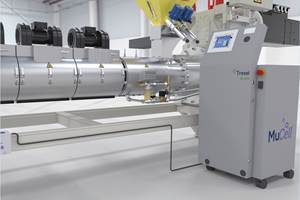New Closed Loop Study Takes Closer Look At Innovative Recycling Tech
There are reportedly at least 60 technology providers developing transformational technologies that purify, decompose or convert waste plastics into renewed raw materials.
Closed Loop Partners, an investment firm focused on building the circular economy, released a study that looks at the potential of new recycling technology, in particular, chemical recycling. The report says there is at least 60 technology providers developing “transformational” technologies that purify, decompose or convert waste plastics into renewed raw materials. This report defines the processes as follows:
Purification involves dissolving plastic in a solvent, then separating and purifying the mixture to extract additives and dyes to ultimately obtain a “purified” plastic. Purification processes make it possible to safely transform carpet into yogurt cups, for instance—greatly increasing the value of plastics waste. PureCycle Technologies will do that when it opens its Ohio facility in the next year.
Decomposition is a process that involves breaking molecular bonds of the plastic to recover the simple molecules (“monomers” or “intermediates”) from which the plastic is made. In other words, plastic doesn’t just have to go back to plastic—it can become a valuable raw material to be used again. Loop Industries decomposes PET into its monomers and, with its partners, aims to produce a Loop-branded recycled PET pellet. (For more about Loop, check out my interview with Loop’s Chief Growth Officer Nelson Switzer here).
Conversion is similar to decomposition in that the process involves breaking the molecular bonds of the plastic. A key difference is that the output products from conversion processes are often liquid or gaseous hydrocarbons similar to the products derived from petroleum refining. These raw materials may enter different supply chains, such as fuels for combustion, and/or petrochemicals that can be made into intermediates and monomers for new plastics. Agilyx, based in Oregon, uses both decomposition and conversion technologies that can produce a variety of products, including naphtha, jet fuel, synthetic crude oil and styrene monomer, depending on the feedstock. (Check out my OnSite about Agilyx here).
Through these technologies, it’s possible to recycle plastic back into plastic, AND to create valuable upstream products that keep materials in play, Closed Loop stated.
Closed Loop surveyed more than 60 technology providers—broadly categorized as using one (or more) of three processes described above—nearly all of them at least at the lab stage of maturity, with significant potential to grow and scale. More than 40 of these solution providers are operating commercial scale plants in the U.S. and Canada today, or have plans to do so within the next two years.
But of the technology providers surveyed, it has taken them 17 years on average to reach growth scale. Closed Loop says that more investment is needed now to accelerate these solutions – to go from “possible” to “probable.”
The Center for the Circular Economy at Closed Loop Partners is creating a roadmap for how to build on this momentum by unifying the diverse actors in this space and accelerating collaborative investment to bring solutions to scale. About 250 investors and strategic partners, including the world’s largest brands, private investors, petrochemical companies and plastic manufacturers, and government and NGO partners, are already engaging with the companies profiled in the report.
Closed Loop believes that current mechanical processes and infrastructure aren’t enough to support the publicly stated goals of many global brands who have committed to use more recycled plastics in their products and packaging, or to achieve the zero waste goals of our major cities.
That’s why we are calling on investors, brands, and industry to join us in: investing to bring solutions to scale; increasing awareness of how these technologies apply to different supply chains and waste streams, including adopting the shared language from this research; and collaborating on partnerships with technology providers, Closed Loop stated.
According to Closed Loop’s analysis, if these technologies can meet market demands for plastics and petrochemicals, they have a potential addressable market of $120 billion ($47 billion for polymers) in the U.S. and Canada alone.
Full report: Accelerating Circular Supply Chains for Plastics.
Related Content
How to Optimize Color Evaluation of Recycled Plastics
The right color measurement instrument and good working methods will minimize variability in color evaluation of PCR.
Read MoreNPE2024 Wrap-Up: Sustainability Dominates Show Floor News
Across all process types, sustainability was a big theme at NPE2024. But there was plenty to see in automation and artificial intelligence as well.
Read MoreFoam-Core Multilayer Blow Molding: How It’s Done
Learn here how to take advantage of new lightweighting and recycle utilization opportunities in consumer packaging, thanks to a collaboration of leaders in microcellular foaming and multilayer head design.
Read MoreMultilayer Solutions to Challenges in Blow Molding with PCR
For extrusion blow molders, challenges of price and availability of postconsumer recycled resins can be addressed with a variety of multilayer technologies, which also offer solutions to issues with color, processability, mechanical properties and chemical migration in PCR materials.
Read MoreRead Next
See Recyclers Close the Loop on Trade Show Production Scrap at NPE2024
A collaboration between show organizer PLASTICS, recycler CPR and size reduction experts WEIMA and Conair recovered and recycled all production scrap at NPE2024.
Read MoreBeyond Prototypes: 8 Ways the Plastics Industry Is Using 3D Printing
Plastics processors are finding applications for 3D printing around the plant and across the supply chain. Here are 8 examples to look for at NPE2024.
Read More























